
Volunteers at the heart of the Mulago Palliative Care team
![]() Ian Robinson
Ian Robinson
![]() 31st March 2020
31st March 2020
Cairdeas’ main partners in Uganda are the Palliative Care Education and Research Consortium, a partnership that has been strong since its inception over 10 years ago. PcERC is a small and dedicated team based at Mulago Hospital in Kampala. As well as the main staff team, PcERC is supported by a team of dedicated volunteers. The volunteer team is coordinated by Toko Friday Santiago, a former volunteer who is now a Cairdeas Scholar studying a BSc in social work. Alongside his studies Toko acts as PcERC’s volunteer coordinator.
Two of the longest serving volunteers are Vicky and Ronald, who have both been volunteering for 6 years. Ronald and Vicky come into Mulago Hospital for two half-days per week. Their role is to identify the social and spiritual needs of the palliative care patients being seen by the PcERC team and offer support and care to address these needs. This support could be in the form of exercises for the patient to do, cleaning or bathing, taking patients to investigations and feeding back to Toko and the PcERC team any concerns they might have. As well as this practical support, the volunteers may simply sit with a patient, listening to their stories, and spending time with their families. Vicky explains how she sees her work as going beyond what people expect, whether they say thank you or not. “It’s about passion and working for God” she explains, “Caretakers might leave and a patient needs companionship… If you provide a patient emotional support, you will see a benefit in their physical health”. Caretakers are often family members of the patient who have to take care of the practical needs of the patient.
For a time PcERC had a comfort fund which allowed them to provide financial support towards medicines and investigations in situations where a patient was unable to afford them. Unfortunately, the team’s resources are too stretched to offer this support service anymore, but they are well integrated within the network of organisations in the hospital. Volunteers are able to liaise with other organisations such as Caring Hands to provide this support to patients, though this NGO is only linked with the main hospital and not the Cancer Institute where many of PcERC’s patients reside.
Each year, the team of volunteers are trained by Mike and Liz Minton who equip them with the skills needed to provide spiritual and psychological support to those living with life limiting illness. The team also receive support from a pro bono legal team who may need to help out in situations where there’s a danger of a patient losing their property.
Outside of their volunteering, Vicky owns a business and Ronald works for a children’s NGO. Ronald explains that his ambition is to study a BSc in social work. They explain that the greatest challenge of the role is how they will build up rapport and even friendship with a patient, then they may come in one day to find the patient has died or been discharged. When asked why they offer their time to care for these patients, Ronald shared, “at the end of our conversation, a patient may ask ‘will you come back tomorrow?’ and this gives me joy”. Vicky said, “I feel complete. It is the opportunity to give to others what God has given me”.
Since I met with Ronald a few months ago, he was diagnosed with cancer just a few weeks before his wedding. Thankfully, he was able to get married and recieved treatment, though this is still ongoing. Even small procedures in Uganda are expensive and, as a dedicated PcERC volunteer, Cairdeas have been supporting him through this time. If you would like to read more about Ronald's story and if you would like to offer your support, you can do so by clicking this link.
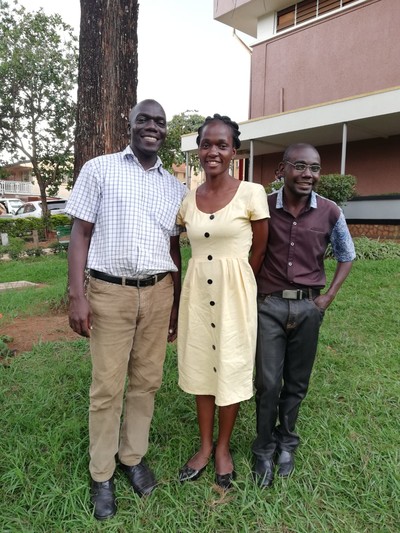
Volunteer coordinator, Toko (left), with volunteers Vicky and Roland
Compassion and Humanity: Palliative Care in the Gaza Strip
![]() Cairdeas
Cairdeas
![]() 27th January 2020
27th January 2020
Towards the end of 2019, a team travelled to Gaza to deliver teaching in palliative care to first year medical students and take part in the first palliative care conference to be held in Palestine. Among this group were Cairdeas Medical Director, Mhoira Leng, and Trustee, Elizabeth Swain. In this blog, Elizabeth shares her experience teaching palliative care skills in a war-stricken country and reflects on the role of compassion and humanity in dealing with trauma.
Dr Abdel’s Mum invited us all for tea at the family home in Gaza City just near the Commonwealth Graves Commission Cemetery. “Remember, Abdel, you are human too and so treat all your patients as you would treat me”. This is what she says to him each day he leaves the house to go to the hospital. What generous hospitality and what a delightful evening we had. Dr Abdel had been “lent” to us from the University as a teaching assistant but he did so much more and kept us out of trouble. He and his Mum made sure we sampled many of the delights of Gazan cuisine.
We shared his Mum’s good advice with the 132 first year clinical students at the Islamic University of Gaza who we taught for a week in palliative care. What a delight they were – keen, enthusiastic, hardworking and “big eyed” to have a team of 6 foreigners teaching them. Maybe it was the first time they had experienced working in small groups discussing case studies of patients with life limiting conditions, seeing patients on the hospital wards and considering spiritual as well as the physical and social concerns of their patients, and they responded enthusiastically.
Perceptive, sensitive and caring youngsters – a career in medicine ahead of them in a very tense part of the world where the care of trauma patients is more in demand than in those with palliative care needs. Their feedback of the values they had seen demonstrated in Palliative Care - love, joy, humility, justice, hope, empathy, compassion, team work, humanity, respect - brought US much joy and were hugely encouraging.
Mhoira, Alice and I were privileged indeed to be invited to take part in the first ever Palliative Care conference held in Palestine at which we all presented papers. We were part of a small cohort of overseas speakers and as such had very much front row seats in the conference hall which made us vulnerable to the many photographers in attendance!
Gaza’s population is made up of 70% refugees from the war of 1948 and their educational and health needs are the responsibility of the United Nations. I was delighted to go with a very senior nurse to visit a couple of the primary care centres. There is a keenness to explore the possibilities of Palliative care but a funding crisis in 2018 prevented progress in this. Janet – one of the team spent a happy and productive time talking with a group of nurses keen to know much more.
It is a troubled part of the world and care of trauma casualties takes a lot of resources, but in terms of pain management and compassion there are transferrable skills and attitudes.
Mhoira and her co-authors Rachel Coghlan Omar Shamieh, Khamis Elessi, and Liz Grant bring this out in a letter recently published in the Lancet and suggest, too, a role in conflict management. (Read the full letter here)
“To claim that palliative care alone could be the solution to the conflict in the Gaza Strip and other conflicts like it, which often seem like intractable political calamities, would be naïve and careless. Yet we do believe that the compassion and humanity intrinsic to palliative care affords it a powerful role in working towards conflict resolution.”
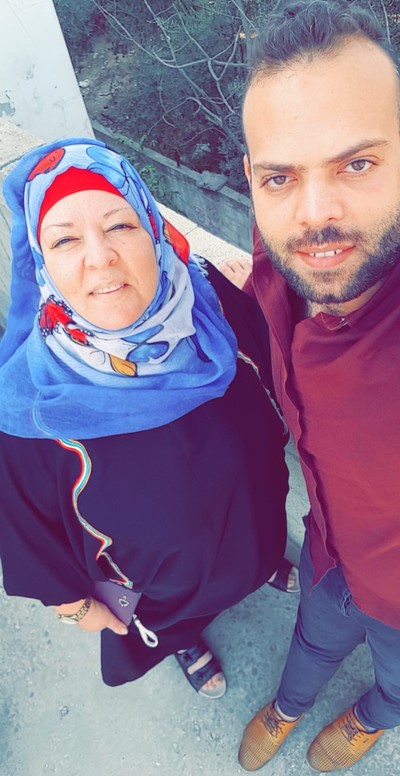
Abdel and his Mother
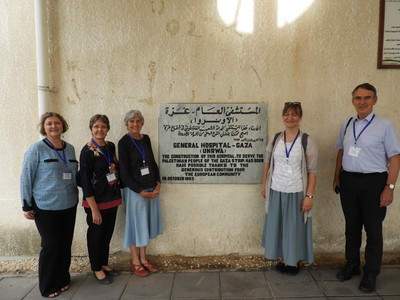
The team from the UK: Mhoira Leng, Janet Gillett, Elizabeth Swain, Alice Gray and Tony Jefferis

The class and the team
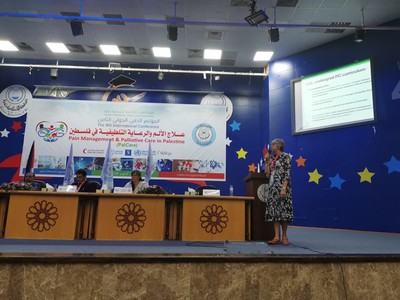
Elizabeth speaking at the conference
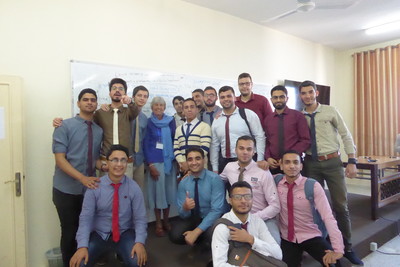
Some of the 'lads' after a small group discussion
Training Scholarships: Jack’s Story
![]() Cairdeas
Cairdeas
![]() 17th December 2019
17th December 2019
Dr Jack Turyahikayo completed a master's degree in palliative care supported by a scholarship from Cairdeas. In this blog, Jack shares how the training impacted his role as a doctor and continues to impact the lives of others through his work. If you would like to donate to support further training scholarships like Jack's, follow this link.
Training as an internal medicine physician, I had high expectations of pursuing palliative care medicine as my career path. This vision still hangs in the balance due to the absence of palliative care positions among public institutions in Uganda. This situation is soon changing, following a commitment by the Ministry of Health to avail consultant positions in teaching public hospitals.
My master’s training in Makerere University, College of Health Sciences was quite eventful and academically intense but equipped me with the necessary knowledge, skill and attitude to provide impactful services. I reflect on this experience with gratitude and gladly appreciate Cairdeas for the scholarship provided for the master’s program.
My journey post-master’s training has been a humbling experience as I continue to improve care for patients with great palliative care need in Uganda and Africa.
I currently work as a part time physician providing palliative care services in the Mulago National Referral hospital and Kiruddu Hospital, an axillary facility currently mandated as a training hospital for both under- and post-graduate students of the College of Health Sciences, Makerere University. I participate in teaching and supervising students rotating in the palliative care service and mentoring future leaders in palliative care pursuing various levels of qualifications at the Institute of Hospice and Palliative Care in Africa (IHPCA). My hope is to improve capacity and build a critical mass of great leaders to place palliative care at higher levels in Africa.
Last year, I conducted a study in collaboration with a resident student from Stanford University. We looked at diagnostic and prognostic awareness among patients with advanced breast cancer and their family members. This study yielded key findings about this important subject which were presented at the APCA conference last month. Thoughtful insights were shared with interested partners and stake holder for future implementation. The APCA conference also provided the opportunity to engage, interact and network with distinguished researchers about future collaborations and partnerships with our palliative care service in Mulago.
As a palliative care service, sustainability has been a big challenge in the last few months. Many services have scaled down or completely halted their services. For sustainability, we expanded our services to include 2 private facilities (Nakasero hospital and Aghakan clinic). I run a weekly outpatient clinic at Nakasero hospital but also attend to admitted patients that have palliative care needs referred to the clinic. My colleague, Dr Namukwaya Elizabeth provides similar services at Aghakan clinic. Our expectation is that we can generate some resources that can help sustain the service for the many who cannot afford.
Huge challenges of sustainability still exist for several palliative care services in Uganda and Mulago/Makerere Palliative Care Unit is not exempt. We work very hard to provide palliative care to those in need and sincerely hope for potential collaborators, partners and donors to support this much needed care to several patients not only in Uganda but also Africa at large.
If you would like to support more scholarships like Jack's, donate to our 2019 Christmas Appeal by visiting www.cairdeas.org.uk/get-involved/donate and selecting 'training scholarships' from the dropdown list.
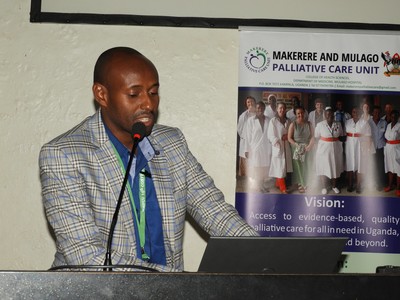
Dr Jack presenting research at the Mulago and Makerere Palliative Care Unit 10th anniversary
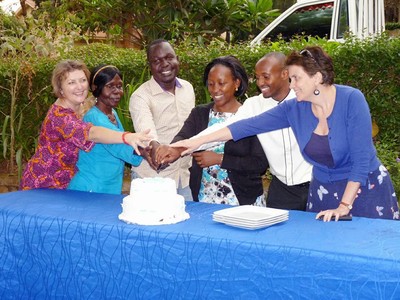
Jack with colleagues and friends celebrating their graduation
